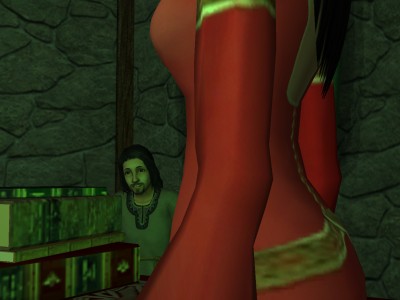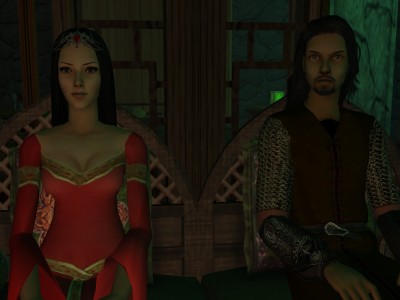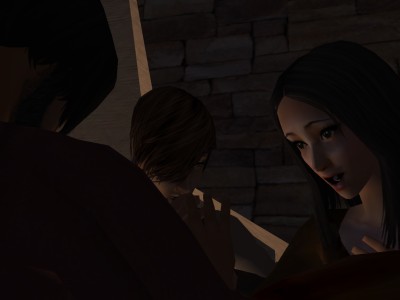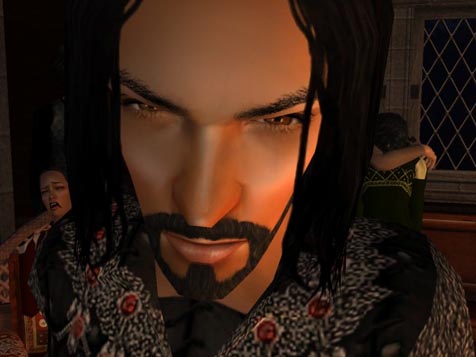Sunday 12 August 2007
Devin has asked me point-blank why I killed Matilda and Sela. As it happens, both Egelric and Matilda have been on my mind quite a lot lately, so although it’s been quite a few months now, I’ll try to remember what I was thinking at the time, and maybe add in a few of my recent reflections.
If you haven’t even read as far as their deaths yet, sorry for the spoiler. And if you don’t want to know how or why or when they died, better save this post for later!
Matilda

By the time Matilda had her affair with Leofric, she was already on her way out, though I don’t know that I knew it or admitted it then. She was very unhappy at that time, in part due to her miscarriage at the end of 1078 and her fear that she was too old to have any more children – which would have meant that she was simply old. As Alred explained to Sigefrith:
“That, and then Matilda was lying in wait for me when I finally came to bed.”
“To fight with you, or what?”
“What.” He yawned again.
“Well, that’s nothing to yawn over.”
Alred shrugged impatiently. “I wouldn’t if I thought she wanted me. I think she only wants a baby.”
“That’s… new.”
“I suppose she fears it’s her last chance. She has stopped thinking about her own mortality long enough to think about mine.”
Alred believed that it was because he was about to go away to war, and in fact that may have been part of it.
But he was wrong if he thought she was “thinking about her own mortality”. Her fear of being old was not the fear of dying. She had made a pitiful attempt to embrace it, beginning to dress primly and wear her hair up, but it wasn’t too convincing.

Leofric scolded her for it (growling!):
“Never have I wanted to strangle you more,” he growled. “You have infuriated me a thousand times in the past, but always because you were heedless and headstrong and arrogant and bold. Now you are dull and bitter and small. And weak! And afraid! Eadgith wears her age with more dignity than you. You – whoever you are – are only a wasp in Matilda’s body – and you don’t even spare her body, but cover it up with this ridiculous grandmother’s dress, and let her shoulders droop, and let her head hang.”
That speech cured her of the grandmother’s dress, but not of her unhappiness. I have tried to find a chapter that really expresses it well, but other than the occasional glimpses we got of it from Alred’s point of view, such as in the above-linked chapter, I usually tended to dance around it when we got a chapter from Matilda’s. She was not very good at admitting certain things to herself.
I think the rawest expression of it is in the chapter in early 1079 where she bumps into Leofric in baby Dora’s room:
“And who are you?” [she asked.]
“Your friend.”
“It is not enough to declare oneself my friend, to make it so!”
“Am I not?”
He tried to keep his voice firm, but his eyes were like the eyes of her children when she lost patience with them, snapped at them, and said harsh things. They were the eyes of a child who fears that the bedrock of love that underlaid his life was not as stable as he had supposed.
She hated him for looking at her with those eyes, as she hated her children at such moments, for making her see herself in all her vicious, petty ugliness. Her love crumbled and shifted like piles of wet sand. She hated herself most of all.
Of course, Leofric himself has a part in all of this. There had always been a chemistry between them, even long before the story began. I think Leofric said somewhere that if he had known Matilda before he had married Eadgith, he would have managed to take Matilda for himself. He might have succeeded, too.
I believe we get our first good look at the two of them together in 1076 in this somewhat disturbing chapter:
“I don’t need to [make him jealous] to prove to myself that Alred loves me, Leofric. He shows me in other ways.” She smiled meaningfully.
“A man doesn’t need to love for that,” he laughed.
“No, but if he does, a woman knows it,” she said with a firm nod.
“You know a lot about it. Have you ever been with another man?”
“No…”
“Then I shan’t bother attempting to disenchant you.”
She giggled. “I hope not, for I can imagine what it might involve.”
“On second thought…” he said with a leer. “But I should have to find another man to do it, for I myself am hopelessly in love with you.”

We now know that Matilda was, in fact, the love of his life, insofar as a Leofric can have one of those. As he said once, she was the only woman he ever thought better than a man, and the only woman he had ever called his friend.
The feelings were not quite mutual. I don’t know how explicit I have been on this point outside of the story, but the biggest attraction for Matilda in Leofric was in his resemblance to her father. This was evident as early as their first little aborted affair in 1078:
He was not the groping brute she had expected; he had, at least, the rude gentleness of tall, strong men who have learned to take care with the small creatures they occasionally hold. In this he reminded her very much of her father.
He reminded her of her father in other ways. When they sat together on the floor, she had fallen back into her old habit of pulling up her knees and sitting between his legs, staring up into his face as they talked. She had often sat so with her father when they had camped out-of-doors…
And if he reminded her of her father, she reminded herself of the girl she had been then. Such nonsense she said! She was like a child: giggling and whispering and teasing him and clapping her hands with delight at her little jokes and at his ironic replies. It was all she really wanted. She was so tired of being old.

She saw the resemblance half a year later, when she met him in Dora’s room, and it is the theme of the chapter in May where she watches Leofric and Dunstan playing chess and falls asleep against Leofric’s arm:
The only thing that seemed real was Leofric’s arm beside her…
In her fatigue, she knew it as well as she had known her father’s arm when, years before, she had sat at his side at the Earl’s great table, long after she should have been in bed. Her father would let her sit up with the men as long as she could keep her eyes open, and many nights she had leaned for hours against his arm so that she might concentrate the last of her energy on her eyelids. For hours he would sit still so that she would not be jostled, and then, suddenly it always seemed, the arm would be around her shoulders, and his other would slip under her knees, and he would carry her up to her bed.
She thought she would willingly die tonight if only her father could carry her up to her bed one last time. Perhaps, she thought, perhaps when her time came, tonight or some other night, her father would come for her, and he would carry her up to paradise. For eighteen years he had been waiting there for her. For eighteen years she had been trudging on alone without him. Now she was tired. Now all she wanted was to fall sleep against his arm.
…
They stood, and Dunstan scrambled to open the door for her.
“Finish your game,” she muttered in reply to his goodnight, scarcely daring to look at him.
She did not look at Leofric at all.
She was so tired. She was tired with thirty-seven years of living, but she knew she would not die tonight. She trudged up to her bed, alone, without him.
I deliberately left the “him” unspecified in the last line – it could have referred to Leofric or to her father. By this time I already knew that she and Leofric were on the verge of going too far, and I also was already beginning to plan to let her die. The title of that chapter (“Matilda drifts off”) was intentional foreshadowing of the way she would experience her death.
I think Matilda already knew it too. Her affair was, in her very troubled mind, a suicide. She was quite surprised when she did not die after sleeping with Leofric:
It was done. A great calm lay over her like his body. It was the blank peace of surrender. It was the calm of despair.
He would sleep; his body would lie over her like a great calm, and she would die. Sleep would be the end.
“God, don’t let me sleep,” Leofric muttered.
He rolled onto his back and pulled her with him so that she lay along his side.
“What?” she asked in alarm. This was not how it was supposed to end.

The end of that chapter may have been a little confusing:
He pulled her head down onto his chest and squeezed her. “You shall see me tomorrow night.”
“I shall?”
“You shall.”
She relaxed against him, calm at last. She saw it wouldn’t end tonight. Tomorrow night it would begin again.
Her reaction was not one of “Yay! We get to do this again tomorrow!” but “Tomorrow, that will be the time I die.”
By the time Alred came home in August, she had convinced herself she was already dead. This obscure little chapter (which still makes me feel sick out of sympathy for poor Alred) is worth rereading entirely, but here’s a bit:
She was almost certain she was already dead. Perhaps he would not even notice it until she began to stink. Or perhaps her little, doll-like body would go on a long while without her. Her heart – her soul – her true, living self was far away.
She had let her heart run empty because she had not thought she would ever need it again. She had thought everything would come to an end. She had not known how to explain this to Leofric, and now it would not matter if she did.
Her husband lifted her up and laid her down on her back again as gently as if she herself were a baby. His body lay over hers like a shadow. Her doll self lifted its arms to him. Her living self was already far away.
(The doll-self is a reference to Leofric and his puppet-self from earlier chapters.)
The rest of her life is only documented through a few chapters in which we ride along with Alred in his descent into despair.

Sadly, towards the end, she had some sort of regrets. We may never know exactly what went through her mind in her last weeks, because she had suffered a stroke and was half-paralyzed and entirely unable to speak. But there is a hint in her last hour:
She opened her mouth to speak, to try again to ask for Alred. Again, only the animal sound came out…
If she said nothing, he would sometimes sit a long while and hold her hand – the living hand, so that she could feel him, and his warmth, and the warm tears he dried against her fingers.
But if she tried to speak, he would hear the animal sounds she made and soon go away. She had never been – would never be – able to explain.
But Matilda does get her sorrow’s greatest wish answered, as we know, when her father comes to carry her away. It was Alred who suffered the most from her pain, in the end. I think by calling her the love of Leofric’s life, we will have to find a new expression to use for Alred.

Sela

Poor Sela! I wish I could go on for paragraphs upon paragraphs with her as I did with Matilda, but Sela did not get the long-term character development Matilda did. I must admit that Sela was originally intended to be little more than a catalyst for change in Egelric.
Why did I kill her? I had a few rather ugly reasons.
First, I had painted myself into a corner with Sela from the start. Because she was able to talk with Egelric, it would only have been a matter of time before she might have revealed things about the elves I would rather the men not know at that point. Therefore I removed her power of speech. Deus ex machina in the guise of Vash.

As if that wasn’t bad enough, the loss of her voice ruined the character for me. I think some people found it annoying, but I found the way she talked quite charming. Once she lost that aspect of her character, she was just a pretty shadow lurking behind Egelric’s rather monumental personality and raising his babies. She was sweet, but from our point of view she was hardly better than a pet. I could have done more with her, and I should have done more with her, but I failed her there.
Then there was the fact that she did serious harm to Egelric’s relationship with Iylaine. My deus ex machina had the further disadvantage of rendering the two young ladies explosive in combination. If Sela and Iylaine met, Iylaine might come to understand that she (Iylaine) was more than just an ordinary elf… more than just your average khírrón as Vash had already admitted to her. (Is there anyone left who doesn’t realize that Iylaine is/was a sort of Crown Princess?)
And, finally, I had already created the Lar Sim back when Gils was conceived (Gils really is his son in-game), but I hadn’t done anything with him yet. I really hadn’t done anything with the kisór at that point, except make Sela show up. I was itching to bring them into the story somehow, and Sela was going nowhere while posing a danger to the planned evolution of the story, and happy-Egelric was getting boring, and so…

So, yes, the ugly truth is that I killed Sela because she was inconvenient to the story, whereas I killed Matilda because her life and death was an integral part of the story. Sorry, Devin! Maybe we’ll have better luck with Aia. ![]()
Now, I’ll leave you with another little something from the “Why did you kill them?” department, in the form of a sneak preview… Three guesses as to who that scowling Scot is! (Hint: we’ve seen him before.) ![]()








That Scot is Lathir and Marie's older brother.
Well you answered my question I'am not that happy with the answer but as a fellow writer I understand why. I'am currently writing a prologue for my modern day series I Surrender my Heart (mind you my writing and picture taking skills have improved alot) I have killed more than one character. The last two characters I killed truly saddened me because of the way they died. I was very shocked with Matilda and Sela's death. I ignored the foreshadowing that was kinda giving clues that Matilda's time was up. With Sela it was so unexpected. When i first saw the headline for the post I thought the elves kidnapped Sela and the boys but realized that I was only half right. The boys were kidnapped but she was murdered. You claim that you failed Sela not entirely, its your choice to do what ever you want with her character. And right now your adding depth to Sela's character 5 years after her death. So you truly haven't failed her.